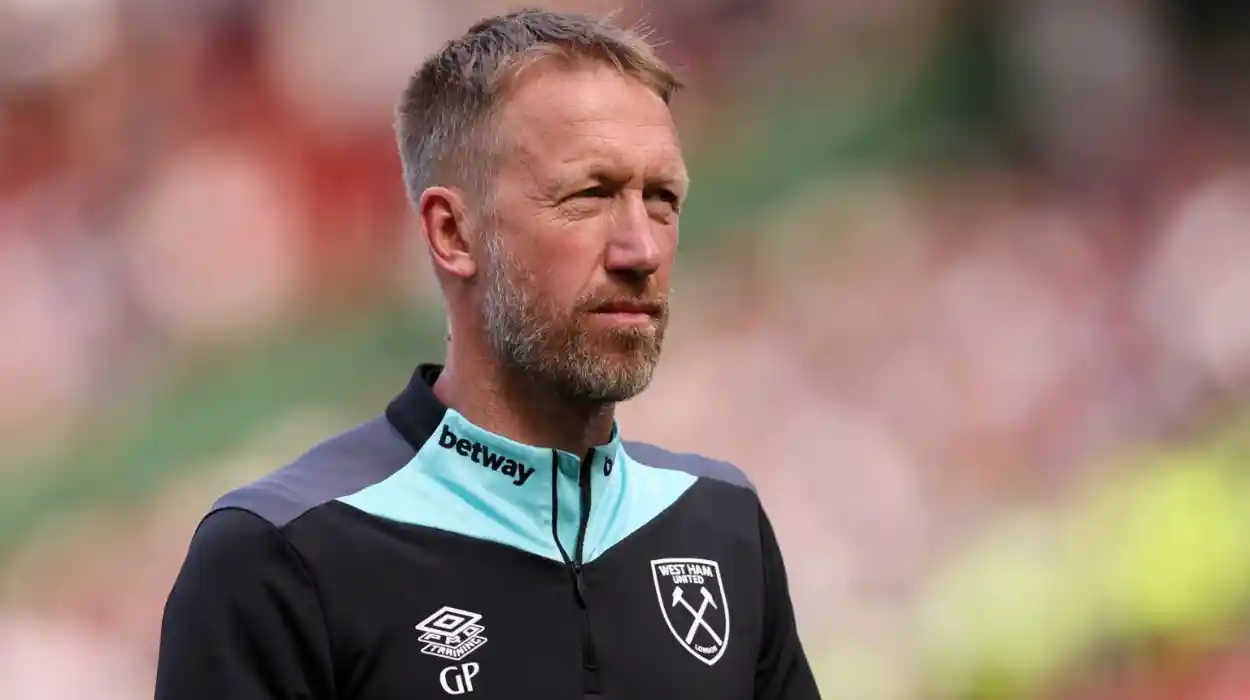Key Points
- David Sullivan, West Ham United co-owner, has set a clear deadline for Graham Potter’s future at the club.
- West Ham’s poor start to the 2025/26 Premier League season has prompted Sullivan’s ultimatum.
- The club’s senior figures are reportedly unimpressed with the team’s performances and results.
- Potter is under pressure as the team struggles in the league and cup competitions.
- The decision reflects growing tension between the club’s leadership and Potter’s management style.
- Potter’s future at West Ham is uncertain with the deadline looming, signaling a potential managerial change.
What Has David Sullivan Said About Graham Potter’s Future?
As reported by Liam Twomey of The Athletic, David Sullivan has set a critical deadline regarding Graham Potter’s position as manager of West Ham United. Sullivan, who is a co-owner of the club, has expressed considerable frustration with the team’s underwhelming performances at the start of the Premier League season. In light of the disappointing results, Sullivan has laid down a clear time frame by which he expects results to improve or else managerial changes will be imminent.
- Key Points
- What Has David Sullivan Said About Graham Potter’s Future?
- Why Is West Ham’s Start to the Season Considered Terrible?
- How Are the Club’s Senior Figures Reacting to the Situation?
- What Does This Mean for Graham Potter’s Future at West Ham?
- How Has Graham Potter Responded to the Pressure?
- What Are the Broader Implications for West Ham United?
- What Has West Ham’s Recent History Been With Managerial Stability?
- What Have Fans and Experts Said About the Situation?
Sullivan emphasised the urgency for Potter to turn things around quickly, or risk losing his job. It is understood that Sullivan believes the current trajectory is unsustainable and that action must be taken to preserve West Ham’s season objectives. With the club enduring what is widely described as a “terrible start,” this deadline marks a pivotal moment in the club’s future planning.
Why Is West Ham’s Start to the Season Considered Terrible?
West Ham’s opening fixtures in the 2025/26 season have been met with disappointment from fans, pundits, and the club’s hierarchy alike. The team has failed to secure enough points, performing below expectations against both top-tier and mid-table opposition. According to Chris Bennett of The Guardian, the lack of consistency and cohesion on the pitch has resulted in mounting pressure on Graham Potter, whose tactical decisions and squad selections have come under scrutiny.
The West Ham squad, boasting several high-profile players, has struggled to gel effectively. The defensive frailties and lack of attacking sharpness have combined to leave the club in a precarious position early in the campaign. The palpable dissatisfaction among supporters has only added to the mounting tension surrounding Potter’s stewardship.
How Are the Club’s Senior Figures Reacting to the Situation?
Inside sources, as noted by Liam Twomey, revealed that senior members of West Ham’s leadership have grown increasingly concerned by the pessimistic mood around the club and the dispirited performances on the pitch. The relationship between Potter and certain segments of the board has reportedly cooled, highlighting a disconnect in vision and expectations.
The club’s executives are believed to be weighing up whether retaining Potter through this period of instability is a viable long-term strategy. This assessment comes amid wider instability across the Premier League where results are paramount and managerial patience tends to be limited.
What Does This Mean for Graham Potter’s Future at West Ham?
David Sullivan’s deadline acts as a stark warning for Potter that his time at West Ham could be cut short if improvement is not seen imminently. According to Chris Bennett’s reporting for The Guardian, if results do not improve within this critical period, the club will be forced to consider alternative managerial options.
Potter, who was brought in with high hopes to build a competitive side capable of European qualification, now faces the reality of a potential sacking—a fate not unfamiliar to Premier League managers who fail to meet immediate expectations.
How Has Graham Potter Responded to the Pressure?
While detailed public comments from Potter on this deadline have been limited, insiders suggest the manager is aware of the fine margin he is operating under. According to an anonymous source cited by The Athletic, Potter is focused on instilling discipline and improving performance during training sessions, but faces the tough task of galvanising a squad under duress.
What Are the Broader Implications for West Ham United?
A managerial change has broad ramifications beyond just tactics. Sullivan’s ultimatum reflects the club’s desire to remain competitive and avoid slipping further down the Premier League table. The pressure to deliver results quickly speaks both to fan expectations and the financial imperatives driving the club.
As detailed by Liam Twomey in The Athletic, the ultimatum is also a signal to players and staff that underperformance will no longer be tolerated, setting a tone of accountability throughout the club structure.
What Has West Ham’s Recent History Been With Managerial Stability?
West Ham’s history in recent years has seen several managerial changes as ownership seeks the right leadership formula. The decision to bring in Graham Potter was part of a strategy to build a progressive, attacking team. However, shifts in the coaching staff or a potential new appointment now would be the latest chapter in a pattern of reactionary changes as the club chases success.
What Have Fans and Experts Said About the Situation?
Media and fan sentiment has largely echoed the concerns of the club leadership. Analysts have critiqued Potter’s tactics and player utilisation, while supporters have expressed impatience with the lack of wins. As Chris Bennett observes in The Guardian, the combination of high expectations and early setbacks has brewed a challenging atmosphere around the London club.



